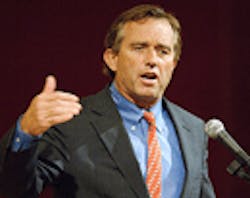Kennedy argues economics of environmental action
BOSTON. According to environmental activist Robert F. Kennedy Jr., implementing a U.S. energy policy that would "de-carbonize" America would not only restore the country's environmental health, but quickly drive the nation's economic growth to new heights.
"Dealing quickly [with hydrocarbons as an energy source] does not have to disrupt the economy," Kennedy said in his keynote address here this morning at the 64th Annual Meeting of NationaLease. On the contrary, he pointed to how quickly nations that have already moved to de-carbonize their energy sources have "experienced extraordinary growth."
He said Iceland was 80% dependent on imported coal and oil in the 1970s and had one of the poorest economies in Europe. "But today it gets 90% of its electricity from geothermal energy and actually exports energy-and it enjoys the fourth highest GDP in the world. Another case he presented is Sweden. He said that after announcing in 2006 a phase-out of all fossil fuels and nuclear energy by 2020, entrepreneurs developed new ways of generating energy from wind, the sun and the tides, and from wood chips, agricultural waste and garbage. As a result, said Kennedy, the economy grew to where Sweden now has the eighth highest GDP in the world. He also noted that by de-carbonizing its transportation system, Brazil is experiencing its largest economic expansion ever.
"And here we have vast untapped energy sources," said Kennedy. "The U.S. sits atop the second-largest geothermal resources in the world. The Midwest is the Saudi Arabia of wind, and solar installations across just 19% of the most barren desert land in the Southwest could supply nearly all of our nation's electricity needs even if every American owned an electric car."
Kennedy said that the "solution is free-market capitalism that rewards 'good' behavior- efficient behavior- versus what we have now, which is [a political and economic system] rigged to reward the least efficient- the polluters. By saving fuel, we can take the money out of the pockets of Saudi princes, clean the air and water for our children, and create jobs that cannot be outsourced," he stated. "And it's not true that it will take 40 to 50 years to do this."
Essentially arguing for American business to indulge in enlightened self-interest to both repair the environment and grow the economy rapidly, Kennedy described several free-market solutions he has been involved in as a venture capitalist dedicated to funding advanced environmental solutions. But he also pointed to exemplary work being done by U.S. companies to reduce their carbon footprints, citing Wal-Mart as a trucking example for its ongoing "green" initiative that will reduce its fleet's environmental impact while cutting its operating costs.
"You'll find there's no stronger advocate for free-market capitalism than I," he said. "True free-market capitalism promotes efficiency- the elimination of waste, and pollution is waste. We have the technology in the U.S., the challenge is leadership," Kennedy said, declaring that the next president has such serious environmental "impediments" to deal such as "trillion dollar subsidies to the oil and coal industries" and the need to rebuild our national electrical power grid. He said the grid is "worn out and inefficient" and needs to be deregulated as the telecommunications industry was in the 1980s, so that even individual Americans can produce and sell their own electricity. "It will cost a half-a-trillion dollars to do this but most of that will be paid by entrepreneurs," he said.
Turning to the politics, Kennedy said he takes a nonpartisan approach to environmental issues because "there are no 'Democratic' children or 'Republican' children" to protect. "The worst thing that could happen would be for the environment to become the province of any one political party.... Good environmental policy is identical to good economic policy."
View more Management news and other trucking industry news from Fleet Owner.
